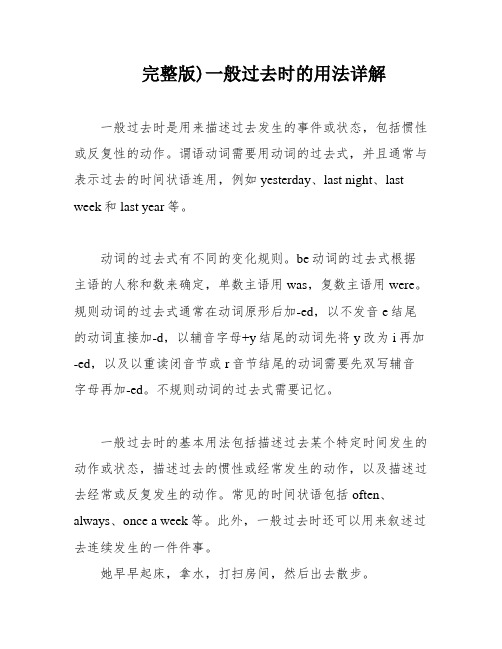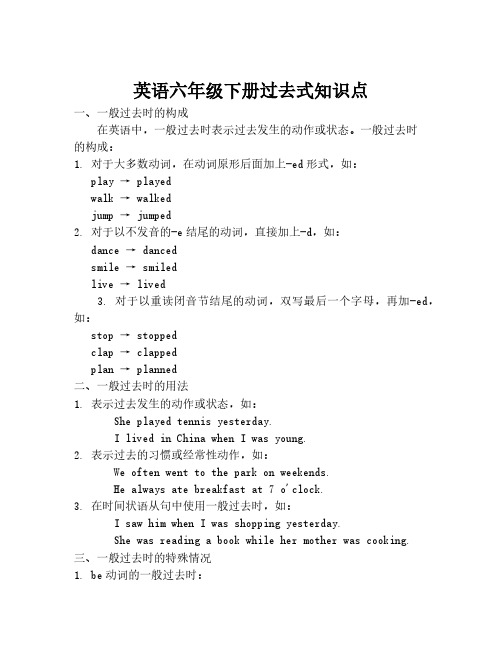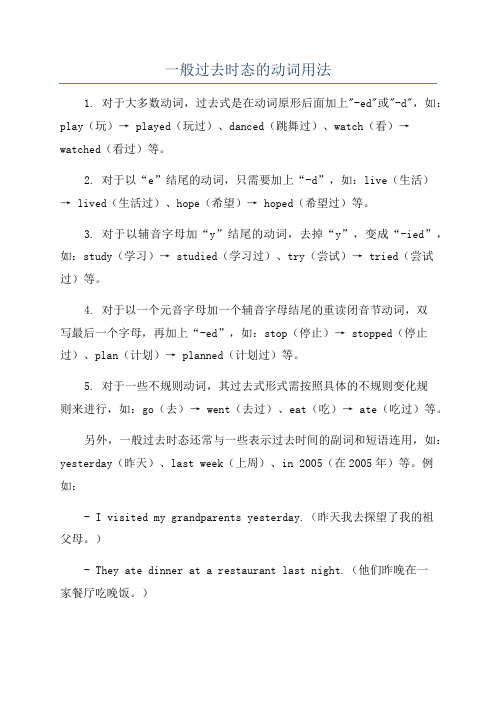六年级【一般过去时的用法】
小学六年级常用动词时态的用法总结

小学六年级常用动词时态的用法总结动词时态是英语语法中一个重要的概念,它用来表达不同的时间和状态。
在小学六年级英语学习中,学生们需要掌握常用动词时态的正确用法。
本文将总结常用动词时态的用法,帮助学生们更好地理解和掌握。
一、一般现在时态(Simple Present Tense)一般现在时态用于表达目前的状态、经常性的动作或客观事实。
一般现在时态的基本结构是主语 + 动词原形。
例句:1. Lucy likes to read books.(露西喜欢阅读书籍。
)2. I go to school every day.(我每天去学校。
)3. The sun rises in the east.(太阳从东方升起。
)二、一般过去时态(Simple Past Tense)一般过去时态用于表达过去发生的动作或状态。
一般过去时态的基本结构是主语 + 动词的过去式。
例句:1. We played soccer yesterday.(我们昨天踢足球。
)2. She lived in London two years ago.(她两年前住在伦敦。
)3. They visited the museum last week.(他们上周参观了博物馆。
)三、一般将来时态(Simple Future Tense)一般将来时态用于表达将来要发生的动作或状态。
一般将来时态的基本结构是主语 + will + 动词原形。
例句:1. I will visit my grandparents tomorrow.(我明天会去拜访我的祖父母。
)2. They will have a party next weekend.(他们下个周末会举办派对。
)3. He will buy a new car next month.(他下个月会买一辆新车。
)四、现在进行时态(Present Continuous Tense)现在进行时态用于表达目前正在进行的动作。
一般过去时的用法及结构

一般过去时的用法及结构1.一般过去时的基本用法一般过去时表示过去某个时间发生的动作或存在的状态,也可表示过去经常或反复发生的动作。
常和表示过去的时间状语连用,如yesterday, last week, last night, in 2003, two days ago 等。
【举例】 I got up at 6:30 yesterday. 我昨天6:30起床。
My father was very busy last week. 我父亲上周很忙。
2.一般过去时的基本结构⑴肯定句“主语+动词过去式+其他”或者“主语+was/were+其他”。
【举例】 I played tennis last weekend. 我上周末打网球了。
My school trip was great. 我的学校郊游棒极了。
⑵否定句“主语+didn’t+动词原形+其他”或“主语+wasn’t/weren’t+其他”。
【举例】 The girl didn’t play computer games yesterday afternoon.这个女孩昨天下午没玩电子游戏。
Old Henry wasn’t happy last Friday. 上星期五老亨利不高兴。
⑶一般疑问句“Did+主语+动词原形+其他?”肯定回答为“Yes,主语+did”,否定回答为“No,主语+didn’t”或者“Was/Were+主语+其他?”肯定回答为“Yes,主语+was/were”,否定回答为“No,主语+wasn’t/weren’t”。
【举例】— Did you go to the beach? 你们去海滩了吗?— Yes, we did./No, we didn’t. 是的,我们去了。
/不,我们没有。
— Was your weekend OK? 你的周末过得还行吧?— Yes, it was./No, it wasn’t. 是的,还行。
/不,不行。
一般过去时的用法

一般过去时的用法一般过去时表示过去某个时间发生的动作或存在的状态。
常和表示过去的时间状语连用。
如:last year, yesterday等;也可表示过去经常反复发生的动作,常和often, always等频率副词连用。
例如:I saw him in the street yesterday. 昨天我在街上看见他了。
Li Mei always went to school on foot last year. 去年李梅总是步行上学。
注意:也可以用“used to +动词原形”表示过去经常或反复的动作。
eg. We used to get up early. 我以前总是早起。
(意指现在不早起了)1.一般过去时的形式:动词be: 第一人称单数和第三人称单数用was, 其余的人称一律用were。
动词have: 一律用had, 没有人称和数的变化。
行为动词:一律用过去式,没有人称和数的变化,行为动词的过去式有两类,一类是规则动词,另一类是不规则动词。
一般过去时动词的肯定、否定、一般疑问句和简略回答以及特殊疑问句的形式见列表:肯定、否定形式行为动词的过去时的否定式,要使用助动词do 的过去式did,后面的谓语动词要还原为原形。
注意:在非正式语如口语中,was not, were not, had not和did not 可以分别缩写成wasn’t, weren’t, hadn’t和didn’t。
2.一般过去时的几种句型(这里只讲行为动词)肯定句结构为:主语+动词的过去式+其他。
如:He went to the toy store yesterday. 他昨天去玩具店了。
否定句结构为:主语+did not (didn’t)+动词原形+其他。
如:He didn’t go to the toy store yesterday. 他昨天没去玩具店。
一般疑问句的构成:Did+主语+动词原形+其他?如:1) -Did you go to Beijing last week?-Yes, we did. (No, we didn't.)2) -Did you meet the businessman before?-No, I didn't. (Yes, I did.)特殊疑问句的构成:疑问词+did+主语+动词原形+其他?如:1) -What did you do last night?-I did my homework.2) -Where did you go last week?-I went to Shanghai with my parents.Ⅱ. 行为动词的一般过去式变化规则行为动词的过去式有规则变化和不规则变化两种。
一般过去时和过去进行时的用法详解

一般过去时和过去进行时的用法详解一、一般过去时的用法一般过去时用于表示在过去某个特定时间或某个过去的时间段发生的动作或存在的状态。
以下是一般过去时的具体用法和相关示例:1. 表示过去的经常性动作或状态:- He played football every Saturday.(他每个星期六踢足球。
)- She always wore a red dress to parties.(她去派对时总是穿红色连衣裙。
)2. 表示过去的完成动作:- I finished my homework last night.(我昨晚完成了作业。
)- They visited their grandparents during the summer vacation.(他们在暑假期间拜访了他们的祖父母。
)3. 表示过去的习惯或特定时间段内的活动:- When he was young, he used to swim in the river every morning.(他年轻时,他习惯每天早上在河里游泳。
)- We lived in London for five years.(我们在伦敦住了五年。
)4. 表示过去的时间状语:- She traveled to Paris last summer.(上个夏天她去了巴黎。
)- He studied French when he was in college.(他上大学时学过法语。
)二、过去进行时的用法过去进行时用于表示过去某个时间点或某个时间段内正在进行的动作。
以下是过去进行时的具体用法和相关示例:1. 表示过去某一时刻正在进行的动作:- They were having dinner at 7 pm yesterday.(昨天晚上7点他们正在吃晚饭。
)- I was watching TV when the phone rang.(电话响的时候我正在看电视。
)2. 表示过去某个时间段内正在进行的动作:- She was studying all day yesterday.(昨天她一整天都在学习。
完整版)一般过去时的用法详解

完整版)一般过去时的用法详解一般过去时是用来描述过去发生的事件或状态,包括惯性或反复性的动作。
谓语动词需要用动词的过去式,并且通常与表示过去的时间状语连用,例如yesterday、last night、last week和last year等。
动词的过去式有不同的变化规则。
be动词的过去式根据主语的人称和数来确定,单数主语用was,复数主语用were。
规则动词的过去式通常在动词原形后加-ed,以不发音e结尾的动词直接加-d,以辅音字母+y结尾的动词先将y改为i再加-ed,以及以重读闭音节或r音节结尾的动词需要先双写辅音字母再加-ed。
不规则动词的过去式需要记忆。
一般过去时的基本用法包括描述过去某个特定时间发生的动作或状态,描述过去的惯性或经常发生的动作,以及描述过去经常或反复发生的动作。
常见的时间状语包括often、always、once a week等。
此外,一般过去时还可以用来叙述过去连续发生的一件件事。
她早早起床,拿水,打扫房间,然后出去散步。
四。
一般过去时的判断标志词昨天,前天,上个+时间,今天早上+时间+前,刚才,一会儿前,过去的+时间五。
一般过去时的句型转换1.谓语动词为be动词时陈述句式:主语+be(was,were)+其他。
否定句式:主语+be(was,were)+not+其他。
一般疑问句:Be(was,were)+主语+其他?特殊疑问句:特殊疑问词+be过去式+主语+其他?例如:XXX:十年前他是一名教师。
否定句式:十年前他不是一名教师。
一般疑问句:十年前他是一名教师吗?特殊疑问句:十年前他是什么职业?2.谓语动词为实意动词时陈述句式:主语+动词(过去式)+其他。
否定句式:主语+didn't+动词(原形)+其他【didnot=didn't】一般疑问句:Did+主语+动词(原形)+其他【do,does 的过去时均为did】?特殊疑问句:特殊疑问词+do/does过去式+主语+动词原形+其他?例如:陈述句式:去年他住在蚌埠。
小学六年级教案一般过去时的用法

小学六年级教案一般过去时的用法过去时是英语语法中最基础的时态之一,对于小学六年级的学生来说,掌握一般过去时的用法非常重要。
本教案旨在通过简单明了的教学方式,帮助学生正确运用一般过去时。
教学目标:学习一般过去时的概念及其基本用法,并能正确运用于日常生活的口语交流中。
教学材料:教科书、黑板、彩色笔、图片、示例句教学步骤:Step 1: 介绍一般过去时的概念 (Concept of Simple Past Tense)为了让学生更好地理解一般过去时,老师可以结合相关图片或者实例来进行讲解。
可以使用一些过去时的动词,比如“played”、“visited”、“ate”等,并问学生这些动词是表示现在还是过去的动作?然后解释一般过去时是用来描述已经发生的过去的动作、事件或状态。
Step 2: 一般过去时的构成 (Formation of Simple Past Tense)在这一步,老师可以向学生展示一些一般过去时的句子,并让学生观察这些句子的结构。
可以使用黑板或幻灯片来展示示例句。
例如:- 我昨天玩了游戏。
(I played games yesterday.)- 她去年参观了博物馆。
(She visited the museum last year.)- 我吃了一块巧克力。
(I ate a piece of chocolate.)解释一般过去时的构成规则:1. 对于大多数动词,直接在动词原形后面加上-ed即可。
例如:play - played, visit - visited。
2. 对于以e结尾的动词,只需加上-d。
例如:adore - adored, smile - smiled。
3. 对于以辅音字母+y结尾的动词,将y变为i,再加-ed。
例如:carry - carried, study - studied。
4. 特殊动词形式需记忆。
Step 3: 一般过去时的使用方法 (Usage of Simple Past Tense)在这一步,老师可以通过介绍一般过去时的常见用法来帮助学生更好地理解。
英语六年级下册过去式知识点

英语六年级下册过去式知识点一、一般过去时的构成在英语中,一般过去时表示过去发生的动作或状态。
一般过去时的构成:1. 对于大多数动词,在动词原形后面加上-ed形式,如:play → playedwalk → walkedjump → jumped2. 对于以不发音的-e结尾的动词,直接加上-d,如:dance → dancedsmile → smiledlive → lived3. 对于以重读闭音节结尾的动词,双写最后一个字母,再加-ed,如:stop → stoppedclap → clappedplan → planned二、一般过去时的用法1. 表示过去发生的动作或状态,如:She played tennis yesterday.I lived in China when I was young.2. 表示过去的习惯或经常性动作,如:We often went to the park on weekends.He always ate breakfast at 7 o'clock.3. 在时间状语从句中使用一般过去时,如:I saw him when I was shopping yesterday.She was reading a book while her mother was cooking.三、一般过去时的特殊情况1. be动词的一般过去时:am/is → wasare → wereI was tired yesterday.They were at the party last night.2. 不规则动词的一般过去时:go → wenthave → hadeat → atebecome → becamecome → camedo → didgive → gaverun → ransee → sawtake → tookthink → thoughtwrite → wrote请注意这些不规则动词的过去式形式,进行适当的记忆和复习。
一般过去时态的动词用法

一般过去时态的动词用法
1. 对于大多数动词,过去式是在动词原形后面加上"-ed"或"-d",如:play(玩)→ played(玩过)、danced(跳舞过)、watch(看)→ watched(看过)等。
2. 对于以“e”结尾的动词,只需要加上“-d”,如:live(生活)
→ lived(生活过)、hope(希望)→ hoped(希望过)等。
3. 对于以辅音字母加“y”结尾的动词,去掉“y”,变成“-ied”,如:study(学习)→ studied(学习过)、try(尝试)→ tried(尝试过)等。
4. 对于以一个元音字母加一个辅音字母结尾的重读闭音节动词,双
写最后一个字母,再加上“-ed”,如:stop(停止)→ stopped(停止过)、plan(计划)→ planned(计划过)等。
5. 对于一些不规则动词,其过去式形式需按照具体的不规则变化规
则来进行,如:go(去)→ went(去过)、eat(吃)→ ate(吃过)等。
另外,一般过去时态还常与一些表示过去时间的副词和短语连用,如:yesterday(昨天)、last week(上周)、in 2005(在2005年)等。
例如:
- I visited my grandparents yesterday.(昨天我去探望了我的祖
父母。
)
- They ate dinner at a restaurant last night.(他们昨晚在一
家餐厅吃晚饭。
)
- She lived in Paris for a year in 2024.(她在2024年在巴黎生活了一年。
- 1、下载文档前请自行甄别文档内容的完整性,平台不提供额外的编辑、内容补充、找答案等附加服务。
- 2、"仅部分预览"的文档,不可在线预览部分如存在完整性等问题,可反馈申请退款(可完整预览的文档不适用该条件!)。
- 3、如文档侵犯您的权益,请联系客服反馈,我们会尽快为您处理(人工客服工作时间:9:00-18:30)。
一般过去时的用法一、概念表示在的过去某个时间里所发生的动作或存在的状态。
通常在句子里找到表示过去时间的词或词组。
如:yesterday,yesterday morning,yesterday afternoon,yesterday evening,the day before yesterday(前天),last night,last week,last month,last year,a moment ago(刚才),just now (刚才),two days ago,a week ago,in 1990等。
如:I went to bed at eleven last night. 昨晚我11:00睡觉。
一般过去时四种用法;例如:I went to school at 7:00 yesterday morning.我昨天早晨七点去上学。
②表示在过去某个时间存在的状态。
例如:She was not at home last night.她昨晚八点没在家。
③表示在过去经常或反复发生的动作,常和often(经常)、always(总是)、sometimes (有时)等表示频率的时间状语连用。
例如:He often had lunch at school last month.他上个月经常在学校吃午饭。
④表示已故的人所做的事情或情况。
例如:Ba Jin wrote a lot of novels for us.巴金写了很多部小说。
二、动词过去式的构成规律(一)规则动词的过去式1.一般情况下,在动词原形后面加-ed;look→looked play→played start→started visit→visited2.以不发音e结尾的动词,在词尾直接加-d;live→lived use→used3.以“辅音字母+ y”结尾的动词,先将y 改为i ,再加–ed;study→studied, tr y→tried fly→flied4.以重读闭音节(即辅音+元音+辅音)或r音节结尾,末尾只有一个辅音字母的动词,要先双写这个辅音字母后,再加–ed。
stop→stopped plan→planned, prefer→preferred(二)不规则动词的过去式1.改变动词中的元音;begin→began drink→drank come→came eat→ate grow→grew run→ran know→knew win→won speak→spoke take→took write→wrote get→got2.变词尾的–d 为–t ;build→built lend→lent send→sent spend→spent bend→bent3.与动词原形一样;cut→cut put→put cost→cost hurt→hurt shut→shut4.变-ay 为-aid (少数动词);say→said pay→paid lay→laid5.采用不同词根;sell→sold teach→taught buy→bought6.其他。
am/is→was are→were have/has→had do→did三、加“-ed”后的读音方法1.ed加在清辅音后面读/t/。
finished /-t/ help /-t/ asked /-t/2.ed加在浊辅音或元音结尾的,读/d/。
played /-d/ lived /-d/ enjoyed /-d/3.ed加在/t/或/d/后面,读/id/。
wanted /-tid/ needed /-did/ visited /-tid/四、句式变化(一)一般过去时的一般疑问句1.把was, were放在句首,其余位置不变。
由Was…?引导的一般疑问句,肯定答为:Yes,…was. 否定回答为:No,…. wasn’t. 由Were…?引导的一般疑问句,肯定回答为:Yes,… were. 否定回答为:No,… weren’t.如:(1)I was born in Shanghai. →Were you born in Shanghai?→Yes, I was. (肯定回答) →No, I wasn’t. (否定回答)(2)They were in Li Yan’s home last night. →Were they in Li Yan’s home last night?→Yes, they were. (肯定回答) →No, they weren’t. (否定回答)2.在行为动词的句子中,要用助动词词did来引导,其余的语序不变。
要注意的是,要把行为动词的过去式改为原形。
肯定回答为:Yes, …did. 否定回答:No, …didn’t.如:John played computer games last night.→Did John play computer games last night?→Yes, he did. (肯定回答) →No, he didn’t. (否定回答)(二)一般过去时的否定句1.在表示过去存在的状态的句子中,相接在was, were的后面加上not。
如:(1)He was in the park the day before yesterday.→He was not in the park the day before yesterday.(2)We were busy last week.→We were not busy last week.2.在表示过去的时间发生的动作的句子中,要在行为动词的前面加助动词didn’t.然后把过去式的行为动词改为动词原形。
即:didn’t + 动词原形。
如:(1)She played the violin last night.→She didn’t play the violin last night.(2)They swam in the lake yesterday.→They didn’t swim in the lake yesterday.(三)一般过去式的特殊疑问句1.What did …?(主要是询问过去发生了什么事情,注意要把过去式改为动词原形。
)We ate Chinese food last night.→What did we eat last night?2.Where did ?( 主要是询问过去事情发生的地方。
)They sang and dance in the music room yesterday morning.→Where did they sing and dance yesterday morning?3.Who + 动词过去式…?( 主要是询问过去事情发生的人物。
)Mike and Tom climbed mountains last weekend.→Who climbed mountains last weekend?二、句子结构1.在表示某个时间里存在的状态的句子,系动词用过式was,were构成。
如:(1)I was at home yesterday.昨天我在家。
(2)We were in the gym just now. 刚才我们在体育馆。
2.在表示过去某个时间里发生的动作,用动词的过去式构成。
如:I visited my uncle yesterday. 昨天我拜访了我的叔叔。
3.各种句式(1)一般过去时的肯定陈述句:主语+动词过去式+宾语或表语。
He worked in Shanghai ten years ago.(2)一般过去时的否定句:a.主语+didn’t +动词原形+宾语。
(did + not = didn't)He didn't do morning exercises yesterday.b.主语+wasn’t/weren’t +表语。
(was + not = wasn't were + not = weren't)He wasn't an English teacher ten years ago.(3)一般过去时的一般疑问句:a.Did +主语+动词原形+宾语?Did you study English in 1990 ?b.Was/Were + 主语+表语?Was he a pupil five years ago ?(4)一般过去时的特殊疑问句:a.特殊疑问词+did + 主语+动词原形+宾语?Where did your parents live five years ago?What did you do last Sunday?b.特殊疑问词+were/was +表语?Who was at the zoo yesterday?过去时练习:写出下列动词的过去式is\am_________ fly_______ plant________ are ________ drink_________play_______ go________ make ________ does_________ dance________ worry________ ask _____ taste_________ eat__________ draw________put ______ throw________ kick_________ pass_______ do ________专项练习:一.用所给动词的适当形式填空。
1. We ______ (live) in Japan last year.2. Susan_______ (stop) the car on the street yesterday.3. My mother_______ (clean) my room and ______(study) for the English test last Sunday.4. What ______ you ______(do) last night?5. On Saturday morning I _____(play) football.二.用括号内所给动词的适当形式填空。
(1) May__________ (finish) her homework very late yesterday evening.(2) Han Mei __________ (bring) her pet to the park that day.(3) His father __________ (buy) a new computer for him last week.(4) Miss Du__________ (walk) to work every day last term.(5) We __________ (move) to Shenyang 8 years ago.(6) __________ you __________ (have) bread for breakfast this morning?(7) She __________ (give) me a nice present last night.(8) The police __________ (stop) the car and __________ (catch) the thief (小偷) just now.(9) Tom __________ (carry) water for the old man last Saturday.(10)Uncle Wang _____________ ( come )into the room and __________ ( find ) something to eat.(11).Lily ______________ ( study ) in the classroom for two hours and then _________ ( leave ).(12).Jimmy __________ ( do ) a lot today. He _________ ( go ) shopping and ________ ( cook ) supper.(13).We _________ ( go ) to the cinema last night. The film ___________ ( be ) very good.(14).What time _________ you __________ ( get ) to school this morning?改错题1. How is Jane yesterday?2. He go to school by bus last week.3. He often goes home at 6:00 last month.4. I can fly kites seven years ago.5. Did you saw him just now.6. Tom wasn’t watch TV last night.7. I didn’t my homework yesterday.8. He wait for you three hours ago.9. Who find it just now ?10. What did he last week?用所给动词的适当形式填空1.Tom and Mary ___________ (come) to China last month.2.Mike ____________(not go) to bed until 12 o’clock last night. So I _____(get ) up late.3.Mary __________ (read) English yesterday morning.4.There _________ (be) no one here a moment ago.5.I ___________ (call) Mike this morning.6.I listened but ___________ (hear) nothing.7.Tom ___________ (begin) to learn Chinese last year.st week we _________ (pick) many apples on the farm.9.My mother ________________ (not do) housework yesterday.10.She watches TV every evening. But she _______________ (not watch) TV last night.11.________ your father ________ ( go ) to work every day last year?12. —What time _______ you _______ (get) to Beijing yesterday?—We __________ (get) to Beijing at 9:00 in the evening.13.What __________ (make) him cry (哭) just now?st year the teacher ___________ (tell) us that the earth moves around the sun.15.There ____________ a telephone call for you just now. (be)16.There __________ not enough people to pick apples that day. ( be)17.There ____________any hospitals (医院) in my hometown (家乡) in 1940. ( be not)18.There ____________ enough milk at home last week, wasn’t there?19.Eli ____________ to Japan last week. ( move)20. –When _______ you _________ (come) to China? - Last year.21.Did she ________ (have) supper at home?22.Jack ____________ (not clean) the room just now.23._________ (be) it cold in your city yesterday?24.How many people ________ (be) there in your class last term?25.It ________ (be) hot yesterday and most children _______ (be) outside.26. There ________ (be) a football match on TV yesterday evening, but I _________ (have) no time to watch it.27. He ate some bread and _________ (drink) some milk.28. ________ he __________ (finish) his homework last night?29. I__________(be) tired yesterday.30. I ___________(gain ) Arts degree last year.31. What _________ you ___________ (do) last night?32. My grandfather _________ (leave) Hong Kong for New York in 1998.33. What _______ he ________ (do) yesterday?34. Last week I _______ (buy) a new bike.35. He ________ (be) here just now.36. He __________ (not find ) his key last night.37. My father __________ (drink) a lot of wine yesterday.38. ________ you ________ (finish) your homework yesterday?39. I ________ (eat) some eggs and bread this morning.40. Her mother __________ (not give) the girl any present.用括号内动词的正确形式填空(A)Last year Mr. Smith _____ (go ) to China and Japan. He _____ (have) a wonderfultime. He _____ (do) a lot of different things and _____ (talk) to a great number of different people. He _____ (eat) Chinese and Japanese food and _____ (visit) a lot of interesting places. When he _____ (go) back to England, he _____ (be) very tired.(B)A week ago, Kitty and Ben _________ (be) in the countryside. At first, the wind _________ (blow) lightly. The leaves ___________ (blow) slightly in the wind. They ________ (fly) their kite happily in the gentle breeze. Suddenly, the wind ________ (become) stronger. The clouds in the sky _______ (move) quickly. Leaves ________ (fall) from trees. The string on Ben’s kite _________ (break). The sky became dark. Kitty and Ben ________ (go ) home immediately. Kitty and Ben ________ (stay) at home. They __________ (watch) TV. The wind became much stronger. It _________ (blow) fiercely. It became a typhoon. Trees_____ (fall) down. Ships and boats __________ (sink) in the big waves. The typhoon _______ (pass) quickly. The wind became gentler. The big clean-up ________ (begin) immediately. Kitty and Ben went outside again.一般过去时练习题一、句型转换1. The children had a good time in the park.否定句:__________________________________________一般疑问句:________________________________________对划线部分提问:____________________________________2. There were about nine hundred people at the concert.否定句:__________________________________________一般疑问句:________________________________________对划线部分提问:____________________________________3. Ann did her homework yesterday evening.否定句:__________________________________________一般疑问句:________________________________________对划线部分提问:____________________________________4. Last week I read an English book.否定句:__________________________________________一般疑问句:________________________________________肯定/否定回答:____________________________________对划线部分提问:____________________________________5. My brother was in the park just now.否定句:__________________________________________一般疑问句:________________________________________对划线部分提问:____________________________________二、写出下列动词的第三人称单数形式、过去式形式go _______ _______ enjoy _______ _______buy _______ _______ eat _______ _______get _______ _______ walk _______ _______take _______ _______ dance _______ _______write _______ _______ run _______ _______swim _______ _______ find _______ _______begin _______ _______ eat _______ _______play _______ _______ study _______ _______三、用所给词的适当形式填空。
